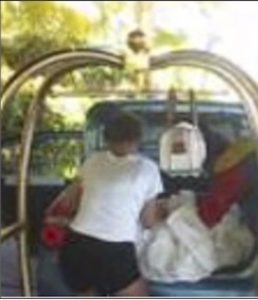Mack seeks 8-year sentence; government wants 28
By Bill Dwyer for Chronicle Media — January 11, 2024

Heather Mack attends to the suitcase containing her mother’s battered body at the St. Regis Resort in Bali on Aug. 12, 2014. (Photo courtesy of U.S. Department of Justice)
As Judge Matthew Kennelly considers a term of imprisonment to impose on Heather Mack at her sentencing Jan. 17, he must consider two disparate portraits of her painted by the defense and prosecution.
Mack pleaded guilty in June to conspiring to brutally murder her mother, 62-year-old Sheila von Weise Mack, while on vacation in Bali in August 2014. She argues in her defense sentencing memo that she has been punished enough between her seven years of incarceration in Bali at the notorious Kerobokan prison, and the 25 additional months spent mostly in lockdown at Chicago’s stark and spartan Metropolitan Correctional Center.
That sentence, which requires serving 85 percent, plus 25 months off for time served in the MCC, would mean Mack was released from prison in approximately 55 months.
She also is asking for leniency for what she contends is a history of childhood trauma and abusive treatment by her mother, and years of watching physical and emotional abuse between her parents. Mack also cited the harm a long period of further incarceration would inflict on her daughter, Stella.
Prosecutors argue that Mack’s responsibility for the “heinous” crime against her mother is supported by a pile of digital evidence, and that 336 months — 28 years — is well below the statutory maximum of life in prison, and well within accepted sentencing standards for the crime she’s admitted committing.
That would keep Mack behind bars for another 20 years, five months. The prosecution is also seeking a $250,000 fine, and $262,780 in restitution for what her mother is estimated by an expert to have received in Social Security benefits had she lived until the expected age 86.

Photo taken by the FBI of a dresser drawer in Heather Mack’s bedroom containing a copy of her mother’s bank statement showing a balance of more than $1 million. (Photo courtesy of U.S. Department of Justice)
Defense attorney Mike Leonard fought hard to mitigate Mack’s overall culpability for the killing and argued strenuously that Mack suffered from years of chaotic and abusive treatment from an emotionally unstable mother. He also stressed her youth at the time of the killing, though Mack was legally an adult.
Leonard refers frequently to a sealed psychiatric assessment of Heather by Dr. Stephen Pesanti. In it, he says, is a long record of “frequent and continuous exposure to domestic abuse and violence.” Not only did Heather suffer such abuse from her mother, Leonard says, she was also physically and emotionally abused by then-boyfriend and father of her child, Tommy Schaefer.
“Ms. Mack witnessed her father slap her mother, push her downstairs and bully her in various ways,” Leonard wrote. That flipped, he said, after James Mack became partially paralyzed after a near lethal infection in 2000. Although not physically violent to James, Sheila Mack did, he claimed, “taunt him and abuse him in other ways.”
“For instance, Ms. Mack recalls that her mother would often place her father’s wheelchair out of his reach, leaving him unnecessarily bedridden and confined to his room and to other spaces.” Mack also contends that her mother would “frequently” get intoxicated and neglect her father’s needs. Such alleged mistreatment angered Heather, Leonard said, and led to arguments and hostility between mother and daughter.
When Heather was a little girl, he said, Sheila Mack was sometimes “physically violent towards (her),” such as slapping, hitting and shaking her violently.
“At that time,” Leonard wrote, “Ms. Mack was too small to, and did not, fight back. As Ms. Mack grew older, this dynamic clearly changed.”
Heather Mack also acknowledged suffering from frequent “bathroom accidents” in grade school, which resulted in bullying from her classmates. Leonard said Sheila Mack required Heather to wear diapers until she was 10 years old, and that when Heather stopped wearing the diapers on her own and her issues resolved, it “seemed to anger her mother.”
Leonard said Heather Mack “fully appreciates her culpability,” and accepts “complete responsibility for the crimes she has been convicted of in Indonesia and the United States. But Heather Mack also believes she’s been punished enough.
Mack points to co-conspirator Robert Bibbs, who was sentenced to nine years in prison for his role in advising Tommy Schaefer on ways to kill her mother. Seeking to draw a parallel to Mack’s case, Leonard wrote, “… even if this court concludes that Ms. Mack had a more central role in the offense than Bibbs, Ms. Mack has already (emphasis his) served more time … than Bibbs will ever serve — by at least a couple of years.”
The prosecution responded that Mack’s role in the killing was indeed far more central than Bibbs, because she was instrumental in both the planning and execution of the conspiracy, and present and participated in it.
Prosecutors hammered away at the premeditated nature of Mack’s scheme, the brutality of the murder, and the months-long effort and planning that went into making it happen. All that, they said, in addition to Mack’s well documented “… years of “… physical, emotional and financial abuse (of) her mother…” in the process of which Mack “committed numerous criminal offenses that went unpunished.”
Prosecutors also attacked Mack’s assertion that her mother frequently physically abused her as a child, saying they were in possession of 166 pages of police reports documenting calls to the home, and that “none of the reports corroborate the defendant’s claims.”
As for any alleged harm to Heather Mack’s daughter, Stella, prosecutors noted that prison sentences often impact innocent family members negatively.
“Every sentencing judge knows that a prison sentence will impose hardships on an offender’s family,” they wrote. “In this case, 336 months will not ‘wreak extraordinary destruction’ (as Leonard argued) on the family unit because the defendant is not and has not been responsible for the upbringing of her child,” either maternally or financially.







